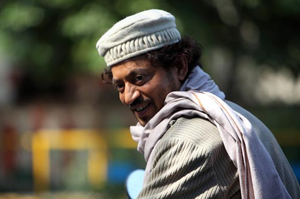 Dubai, Dec 15: Acclaimed Indian actor Irrfan Khan won the best actor award for his brilliant performance in "The Lunchbox" at the 10th edition of Dubai International Film Festival (DIFF).
Dubai, Dec 15: Acclaimed Indian actor Irrfan Khan won the best actor award for his brilliant performance in "The Lunchbox" at the 10th edition of Dubai International Film Festival (DIFF).
Irrfan won the award Friday in the Muhr AsiaAfrica Feature category, while films writer-director Ritesh Batra got a special mention for screenplay for the film about a lunch box, which becomes a symbol of hope, in the same category. World renowned Indian filmmaker Shekhar Kapur headed the jury.
Sandeep Ray won the best director award for his Bengali language film "Shirno Bahu (Thin Arms)", which revolves around an octogenarian woman who undergoes treatment for a debilitating medical condition, in the Muhr Asia Africa shorts category.
DIFF chairman Abdulhamid Juma said that the sense of community this year was palpable.
"After 10 years, we are seeing recurrent visitors, both film professionals and cinema lovers, from the region and beyond. This year we celebrated the gains that have been made in Arab cinema in the past decade, the result of years of work from our team to discover, nurture and promote talent from the Arab world," he added.
"There is a feeling that Arab cinema has 'arrived,' with increasing numbers of Arab films on the world stage, winning awards at the most prestigious festivals, and gaining currency even with audiences who have never visited the region."
The 2013 winners are:
Emirates NBD People's Choice Award:
Chris Buck, Jennifer Lee for American film "Frozen" and Amal Al-Agroobi for "The Brain That Sings" (UAE)
FIPRESCI:
Short: Ahmed Yassin - "Children Of God" (Iraq, UK, Hungary)
Documentary: Zeina Daccache - "Scheherazade's Diary" (Lebanon)
Feature: Mohammed Khan - "Factory Girl" (Egypt, UAE)
Emirates NBD People's Choice Award:
Chris Buck, Jennifer Lee - "Frozen" (US)
Amal Al-Agroobi - "The Brain That Sings" (UAE)
Muhr Emirati:
Special Mention: Mohammad Fikree - "Girl & It" (UAE)
Best Director: Muna Al Ali - "Concealment" (UAE)
Special Jury Prize: Claudia Corbelli and Greg White - "The Neighbour" (UAE)
Best Film: Abdullah Hasan Ahmed and Khalid Al Mahmood - "Don't Leave Me" (UAE)
Muhr AsiaAfrica:
Muhr AsiaAfrica Short:
Special Mention: Cédric Ido "Twaaga" (Burkina Faso, France)
Best Director: Sandeep Ray - "Thin Arms" (India)
Special Jury Prize: Halla Kim - "The Way Back" (South Korea)
Best Film: Askhat Kuchinchirekov "Gas Is Over" (Kazakhstan)
Muhr AsiaAfrica Documentary:
Special Mention: Lynn Lee and James Leong - "Wukan: The Flame Of Democracy" (Singapore)
Best Director: Pin Pin Tan - "To Singapore With Love" (Singapore)
Special Jury Prize: Sara Rastegar - "My Red Shoes" (France)
Best Film: Yoshiko Hashimoto and Shigeki Kinoshita - "The Horses Of Fukushima" (Japan)
Muhr AsiaAfrica Feature:
Special Mention: Souleymane Démé for his role in "Grigris" (France, Chad)
Special Mention: Ritesh Batra for the screenplay of "The Lunchbox" (India)
Best Actress: Yeo Yann Yann - "Ilo Ilo" (Singapore)
Best Actor: Irrfan Khan - "The Lunchbox" (France, Germany, India)
Best Director: Tsai Ming Liang - "Stray Dogs" (Taiwan, France)
Muhr Arab Documentary:
Special Mention: Zeina Daccache - "Scheherazade's Diary" (Lebanon)
Best Director: Salma El Tarzi - "Underground On The Surface" (Egypt)
Special Jury Prize: Diala Kachmar and Carole Abboud,Guardians - "Of Lost Time" (Lebanon, UAE)
Best Film: Karim Amer - "The Square" (US, Egypt)
Special Jury Prize: Sepehr Seifi - "Fish & Cat" (Iran)
Best Film: Ang Hwee Sim, Anthony Chen, Wahyuni A. Hadi,- "Ilo Ilo" (Singapore)
Muhr Arab Short:
Special Mention: Camille Salameh for his role in "Troubled Waters" (Lebanon)
Special Mention: Ahmed Yassin - "Children Of God" (Iraq, UK, Hungary)
Best Director: Ali Cherri - "The Disquiet" (Lebanon, France)
Special Jury Prize: Haider Rashid - "The Deep" (Iraq, Italy)
Best Film: Bavi Yassin, Nore Maatala - "The Lost Voice" (Belgium, Iraq)
Muhr Arab Feature:
Special Mention: Mohammed Amin Benamraoui - "Adios Carmen" (Morocco, Belgium, UAE)
Special Mention: Raouia for her roles in "Rock The Casbah" (Morocco, France) and "Pillow Secrets" (Morocco)
Best Actress: Yasmine Raees - "Factory Girl" (Egypt, UAE)
Best Actor: Hassan Badida - "They Are The Dogs" (Morocco)
Best Director: Hany Abu Assad - "Omar" (Palestine, UAE)
Special Jury Prize: Nabil Ayouch - "They Are The Dogs" (Morocco)
Best Film: Waleed Zuaiter - "Omar" (Palestine, UAE)





Comments
Add new comment